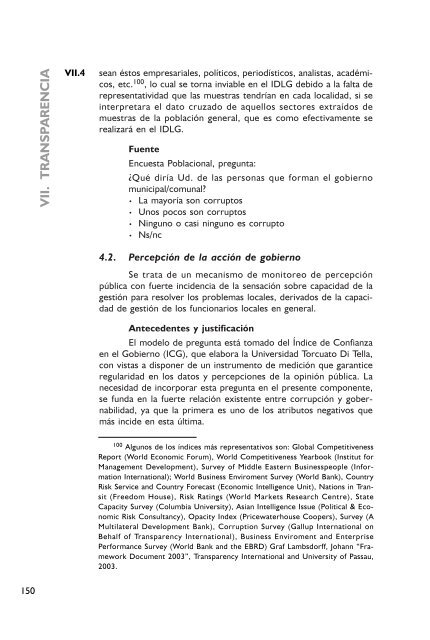02-Indice-de-desarrollo-local-para-la-gestion
02-Indice-de-desarrollo-local-para-la-gestion
02-Indice-de-desarrollo-local-para-la-gestion
You also want an ePaper? Increase the reach of your titles
YUMPU automatically turns print PDFs into web optimized ePapers that Google loves.
VII. TRANSPARENCIA<br />
VII.4<br />
sean éstos empresariales, políticos, periodísticos, analistas, académicos,<br />
etc. 100 , lo cual se torna inviable en el IDLG <strong>de</strong>bido a <strong>la</strong> falta <strong>de</strong><br />
representatividad que <strong>la</strong>s muestras tendrían en cada <strong>local</strong>idad, si se<br />
interpretara el dato cruzado <strong>de</strong> aquellos sectores extraídos <strong>de</strong><br />
muestras <strong>de</strong> <strong>la</strong> pob<strong>la</strong>ción general, que es como efectivamente se<br />
realizará en el IDLG.<br />
Fuente<br />
Encuesta Pob<strong>la</strong>cional, pregunta:<br />
¿Qué diría Ud. <strong>de</strong> <strong>la</strong>s personas que forman el gobierno<br />
municipal/comunal?<br />
• La mayoría son corruptos<br />
• Unos pocos son corruptos<br />
• Ninguno o casi ninguno es corrupto<br />
• Ns/nc<br />
4.2. Percepción <strong>de</strong> <strong>la</strong> acción <strong>de</strong> gobierno<br />
Se trata <strong>de</strong> un mecanismo <strong>de</strong> monitoreo <strong>de</strong> percepción<br />
pública con fuerte inci<strong>de</strong>ncia <strong>de</strong> <strong>la</strong> sensación sobre capacidad <strong>de</strong> <strong>la</strong><br />
gestión <strong>para</strong> resolver los problemas <strong>local</strong>es, <strong>de</strong>rivados <strong>de</strong> <strong>la</strong> capacidad<br />
<strong>de</strong> gestión <strong>de</strong> los funcionarios <strong>local</strong>es en general.<br />
Antece<strong>de</strong>ntes y justificación<br />
El mo<strong>de</strong>lo <strong>de</strong> pregunta está tomado <strong>de</strong>l Índice <strong>de</strong> Confianza<br />
en el Gobierno (ICG), que e<strong>la</strong>bora <strong>la</strong> Universidad Torcuato Di Tel<strong>la</strong>,<br />
con vistas a disponer <strong>de</strong> un instrumento <strong>de</strong> medición que garantice<br />
regu<strong>la</strong>ridad en los datos y percepciones <strong>de</strong> <strong>la</strong> opinión pública. La<br />
necesidad <strong>de</strong> incorporar esta pregunta en el presente componente,<br />
se funda en <strong>la</strong> fuerte re<strong>la</strong>ción existente entre corrupción y gobernabilidad,<br />
ya que <strong>la</strong> primera es uno <strong>de</strong> los atributos negativos que<br />
más inci<strong>de</strong> en esta última.<br />
100 Algunos <strong>de</strong> los índices más representativos son: Global Competitiveness<br />
Report (World Economic Forum), World Competitiveness Yearbook (Institut for<br />
Management Development), Survey of Middle Eastern Businesspeople (Information<br />
International); World Business Enviroment Survey (World Bank), Country<br />
Risk Service and Country Forecast (Economic Intelligence Unit), Nations in Transit<br />
(Freedom House), Risk Ratings (World Markets Research Centre), State<br />
Capacity Survey (Columbia University), Asian Intelligence Issue (Political & Economic<br />
Risk Consultancy), Opacity In<strong>de</strong>x (Pricewaterhouse Coopers), Survey (A<br />
Multi<strong>la</strong>teral Development Bank), Corruption Survey (Gallup International on<br />
Behalf of Transparency International), Business Enviroment and Enterprise<br />
Performance Survey (World Bank and the EBRD) Graf Lambsdorff, Johann “Framework<br />
Document 2003”, Transparency International and University of Passau,<br />
2003.<br />
150


